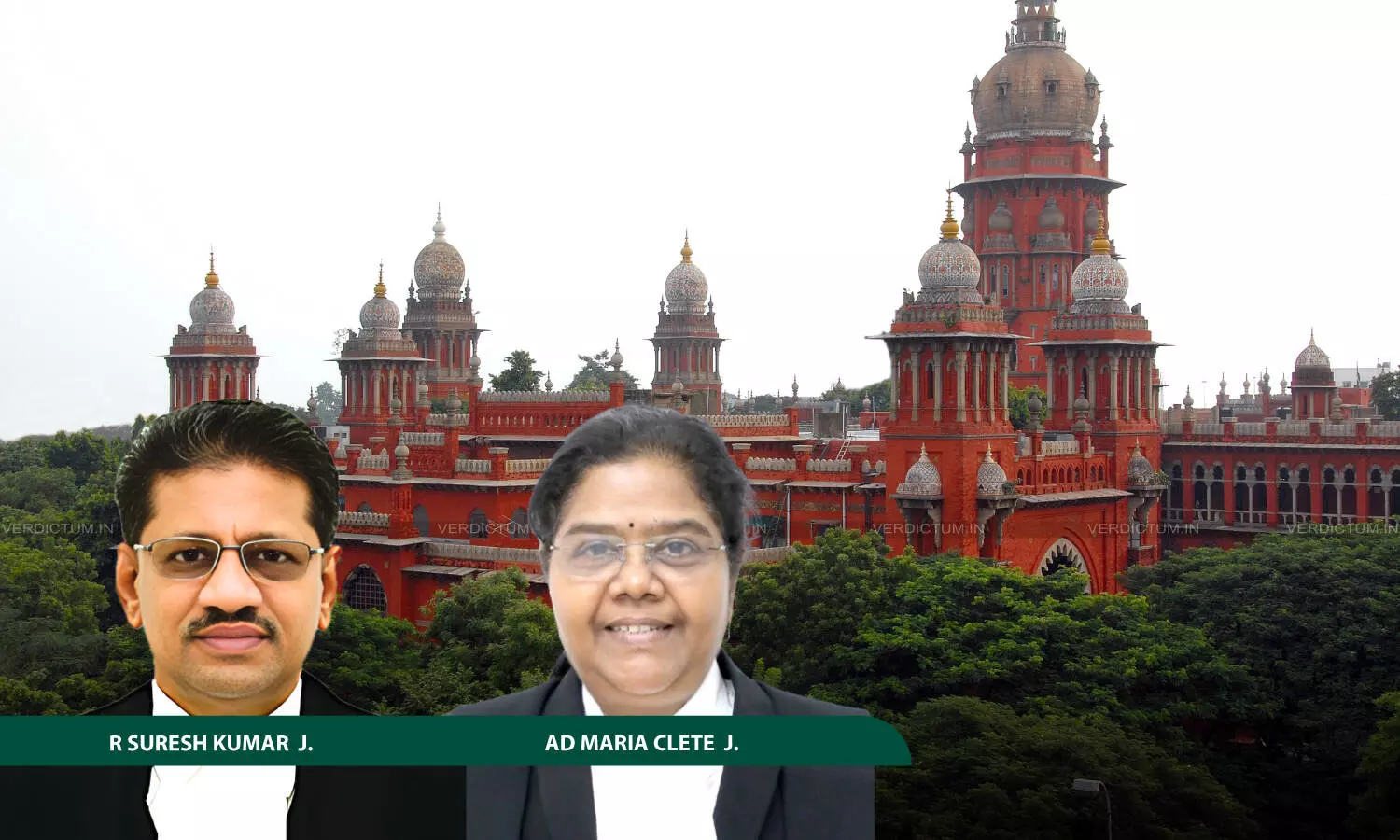
Madras High Court: Judicial Separation Can’t Be Granted In A Petition Filed For Restitution Of Conjugal Rights Under HMA
 |
|The Madras High Court allowed the Appeal filed by the husband in a divorce Petition challenging the Order passed by the Family Court seeking divorce on the ground of cruelty.
The Madras High Court clarified that judicial separation cannot be granted in a Petition filed for restitution of conjugal rights under HMA.
The Court allowed the Appeal filed by the husband in a divorce Petition challenging the common order passed by the Family Court seeking divorce on the ground of cruelty filed by the wife for restitution of conjugal rights. The Family Court negatived the prayers made in both Petitions and instead granted a decree for judicial separation by invoking Section 13A of the Hindu Marriage Act 1955 (HMA).
A Division Bench of Justice R Suresh Kumar and Justice AD Maria Clete held, “While the Hindu Marriage Act empowers the Court to grant a decree of judicial separation in a petition filed for divorce, no such power is contemplated in a petition filed for restitution of conjugal rights. In the present case, when the Family Court rejected the prayer for restitution of conjugal rights in H.M.O.P. No.1224 of 2024, it ought to have dismissed the petition as such, rather than granting judicial separation under that petition. The Family Court, however, proceeded to grant judicial separation in both the petitions, including one where the statutory framework does not permit such relief. It is also relevant to note that although the Family Court declined to grant restitution of conjugal rights, the respondent-wife has not filed any appeal challenging that finding.”
Advocate K.S. Karthik Raja appeared for the Appellant, while Advocate T.K.S. Gandhi represented the Respondent.
Brief Facts
The husband had filed a Petition seeking divorce under Section 13(1)(ia) of the HMA on the ground of cruelty, detailing various instances of mental and physical cruelty, including false accusations, constant quarrels, humiliation in the presence of others, and unfounded allegations that affected his dignity and peace of mind. The wife filed a Petition seeking restitution of conjugal rights under Section 9 of the HMA.
The Family Court held that the allegations of cruelty and desertion were not proved to the required standard, nor was the wife entitled to restitution. However, the Family Court, invoking its discretionary power, granted a decree of judicial separation in both matters.
Court’s Reasoning
The High Court noted that while HMA empowers the Court to grant a decree of judicial separation in a petition filed for divorce, "no such power is contemplated in a petition filed for restitution of conjugal rights".
The Bench noted, “The Family Court further took note of the appellant’s accusations that the respondent was arrogant and frequently left the matrimonial home without his knowledge or consent, and behaved in an insulting manner towards him and his family members. Nevertheless, the Court concluded that such allegations, even if assumed to be true, did not rise to the level of cruelty contemplated under Section 13(1)(ia) of the Hindu Marriage Act. It observed that minor quarrels and interpersonal friction, or incompatibility between spouses, cannot be construed as cruelty unless they cause such grave mental or physical suffering that the continued cohabitation becomes untenable.”
The Court held, “In the absence of convincing proof that the respondent’s conduct had caused the appellant sustained mental pain, trauma, or physical injury, the Family Court declined to grant a decree of divorce. It specifically found that the evidence on record did not establish that the conduct of the wife amounted to cruelty of such intensity as to make living together insupportable. On these findings, the Family Court rejected the husband’s claim for divorce under Section 13(1)(ia) and instead, of its own accord, granted a decree of judicial separation, which was not the relief claimed by either party.”
The Bench clarified, “The mere non-examination of family members cannot, by itself, discredit otherwise cogent and consistent testimony of the petitioner, especially when no material contradictions or admissions were elicited during crossexamination to undermine his version. In the absence of any substantial challenge to the petitioner’s credibility, his evidence could not have been discarded solely on the ground of non-examination of his parents.”
Consequently, the Court ordered, “In view of the foregoing discussion, we are of the considered opinion that the marriage between the parties has irretrievably broken down, and the conduct of the respondent constitutes mental cruelty within the meaning of Section 13(1)(ia) of the Hindu Marriage Act. Accordingly, the decree of judicial separation granted by the Family Court is set aside.”
Accordingly, the High Court allowed the Appeal.
Cause Title: X v. Y (C.M.A.Nos.1422 & 1433 of 2021)